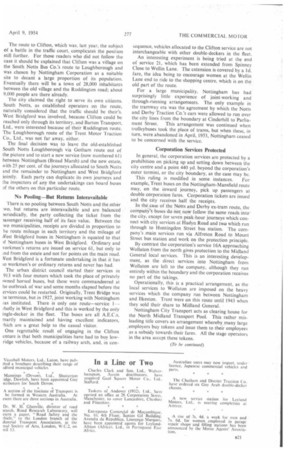3assenger receiving half of its face value. Between the wo
Page 55

If you've noticed an error in this article please click here to report it so we can fix it.
municipalities, receipts are divided in proportion to he route mileage in each territory and the mileage of Vest Bridgford buses in Nottingham is equated to that Nottingham buses in West Bridgford. Ordinary and vorkmen's returns are issued on service 61, but only to Lnd from the estate and not for points on the main road. West Bridgford is a fortunate undertaking in that it has io workmen's or ordinary returns and never has had. The urban district council started their services in 913 with four motors which took the place of privately
■ wned horsed buses, but these were commandeered at he outbreak of war and some months elapsed before the ervices could be restarted. Originally, Trent Bridge was le terminus, but in 1927, joint working with Nottingham ias instituted. There is only one route—service 1— /holly in West Bridgford and this is worked by the only ingle-decker in the fleet. The buses are all A.E.Cs, manly maintained and having excellent indicators, 'filch are a great help to the casual visitor.
One regrettable result of engaging in the Clifton enture is that both municipalities have had to buy lowridge vehicles, because of a railway arch, and, in con
sequence, vehicles allocated to the Clifton service are not interchangeable with other double-deckers in the fleet.
An interesting experiment is being tried at the end of service 21. which has been extended from Spinney Close to Wellin Lane. The extension is covered by a Id. fare, the idea being to encourage women at the Wellin Lane end to ride to the shopping centre, which is on the old part of the route.
For a large municipality, Nottingham has had surprisingly little experience of joint-working and through-running arrangements. The only example in the tramway era was the agreement by which the Notts and Derby Traction Co.'s cars were allowed to run over the city lines from the boundary at Cinderhill to Parliament Street. This arrangement was continued when trolleybuses took the place of trams, but when these, in turn, were abandoned in April, 1953, Nottingham ceased to be concerned with the service.
Corporation Services Protected
In general, the corporation services are protected by a prohibition on picking up and setting down between the city centre and a point 440 yd. beyond the corporation's outer termini, or the city boundary, as the case may be.
This ruling is modified in some instances. For example, Trent buses on the Nottingham-Mansfield route may, on the inward journey, pick up passengers at double corporation fares. Corporation tickets are issued and the city receives half the receipts.
In the case of the Notts and Derby ex-tram route, the company's uses do not noiv follow the same roads-into ' the city, except for seven peak-hour journeys which connect with city services at Hadyn Road and two which run through to Huntingdon Street bus station. The company's main services run via Alfreton Road to Mount Street bus station and work on the protection principle.
By contrast the corporation's service 16A approaching Wollaton from the north gives protection to the Midland General local services. This is an interesting development, as the direct services into Nottingham from Wollaton are left to the company, although they run entirely within the boundary and the corporation receives no part of the takings.
Operationally, this is a practical arrangement, as the local services to Wollaton are imposed on the heavy services which the company run between Nottingham and Ilkeston. Trent were on this route until 1943 when they sold their share to Midland General.
Nottingham City Transport acts as clearing house for the North Midland Transport Pool. This rather misleading title covers-an arrangement whereby many large employers buy tokens and issue them to their employees as a subsidy towards their fares. All the stage operators in the area accept these tokens.




































































































